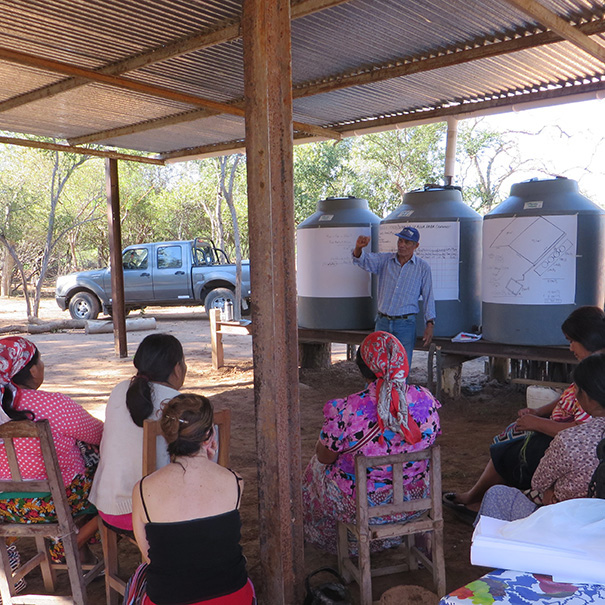Stories of Change

Anacleto Montes presents his family's cistern and water catchment system to a group of visiting Wichi indigenous women. Photo: Margot DeGreef / CWS
The South American Gran Chaco is home to 25 different indigenous groups.
Source: CWS Latin America and the Caribbean
The Montes family: rebuilding on reclaimed land
In the South American Gran Chaco, which spans parts of Argentina, Bolivia and Paraguay, many indigenous communities have lost their land titles to major corporations who deforest the land for the cattle and soy industries. CWS and partners accompany indigenous families in their struggle to reclaim their lands and then overcome hunger and a lack of clean water.
After a decade of waiting, the Montes family was finally able to occupy their family’s land near Los Blancos, Argentina once again in 2011. In order to make the land livable, though, they needed wells. Although the well water was salty, the family moved back as soon as the wells were drilled. “It wasn’t easy to come here,” said Anacleto Montes, the head of the family. “It has been very difficult. It took a long time to receive the land title papers. Our wish was to occupy this land and I was one of those struggling for the land. There was nothing here. Now we don’t need to be afraid of pumas anymore at night.”
Tremendous progress has been made in the last five years, including new water tanks and a cistern to catch rainwater and provide decent drinking water to the family. “We didn’t think the roof could really provide us with water,” Anacleto confessed. But provide water it does. A drip irrigation system connected to one of the wells also makes vegetable production possible in this dry area.
While the Montes family recognizes the role that CWS and partner Fundapaz have played in getting them this far, they feel both ownership and responsibility for their water system. In Anacleto’s words, “We have to work and maintain our resources. If something breaks, it is not the system that doesn’t function, but it means that we are not functioning.”
Despite the progress, there is still a long way to go in reuniting the whole family and thriving. There is no electricity yet, and access to the town for school and clinic use is difficult without transportation. Undaunted, the family is united and full of hope: “The process of regaining and occupying our land is difficult. It is normal to suffer in order to restart.”
The family is now a role model to others in the region. A group of Wichi indigenous women, in addition to staff from CWS and Fundapaz, recently visited the family’s land to learn more about the cistern and water catchment system. As one of the Wichi women said, “I am happy to see new faces that will share our story from this meeting with a group of indigenous women and make us visible around the world.”
